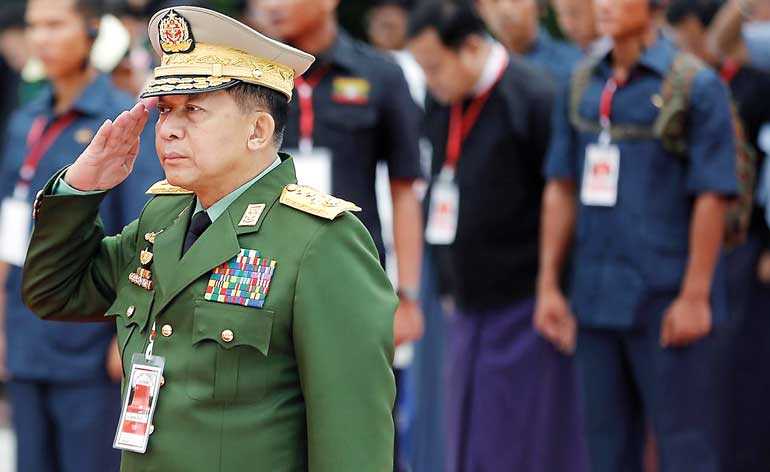Wednesday Feb 18, 2026
Wednesday Feb 18, 2026
Thursday, 18 July 2019 00:31 - - {{hitsCtrl.values.hits}}

Myanmar’s Commander in Chief Senior General Min Aung Hlaing salutes as he attends an event marking Martyrs’ Day at Martyrs’ Mausoleum in Yangon, Myanmar – Reuters
WASHINGTON (Reuters): The United States on Tuesday announced sanctions on the Myanmar military’s Commander-in-Chief Min Aung Hlaing and other military leaders it said were responsible for extrajudicial killings of Rohingya Muslims, barring them from entry to the United States.
The steps, which also covered Min Aung Hlaing’s deputy, Soe Win, and two other senior commanders and their families, are the strongest the United States has taken in response to massacres of minority Rohingyas in Myanmar, also known as Burma. It named the two others as Brigadier Generals Than Oo and Aung Aung.
“We remain concerned that the Burmese government has taken no actions to hold accountable those responsible for human rights violations and abuses, and there are continued reports of the Burmese military committing human rights violations and abuses throughout the country,” US Secretary of State Mike Pompeo said in a statement.
Pompeo said a recent disclosure that Min Aung Hlaing ordered the release of soldiers convicted of extrajudicial killings at the village of Inn Din during the ethnic cleansing of Rohingya in 2017 was “one egregious example of the continued and severe lack of accountability for the military and its senior leadership.”
“The Commander-in-Chief released these criminals after only months in prison, while the journalists who told the world about the killings in Inn Din were jailed for more than 500 days,” Pompeo said.
The Inn Din massacre was uncovered by two Reuters reporters, Wa Lone and Kyaw Soe Oo, who spent more than 16 months behind bars on charges of obtaining state secrets. The two were released in an amnesty on May 6.
The US announcement came on the first day of an international ministerial conference on religious freedom hosted by Pompeo at the State Department that was attended by Rohingya representatives.
“With this announcement, the United States is the first government to publicly take action with respect to the most senior leadership of the Burmese military,” said Pompeo, who has been a strong advocate of religious freedom.
Gross violations
“We designated these individuals based on credible information of these commanders’ involvement in gross violations of human rights.”
A 2017 military crackdown in Myanmar drove more than 730,000 Rohingya Muslims to flee to neighbouring Bangladesh. UN investigators have said that Myanmar’s operation included mass killings, gang rapes and widespread arson and was executed with “genocidal intent.”
The State Department has so far stopped short of calling the abuses genocide, referring instead to ethnic cleansing and a “well-planned and coordinated” campaign of mass killings, gang rapes and other atrocities.
“He (Pompeo) has not come to the point at which he has decided to make a further determination. Generally our policies are focussed on changing behaviour, promoting accountability, and we have taken today’s actions with those goals in mind,” a senior State Department official told reporters, asking not to be named.
The military in Myanmar, where Buddhism is the main religion, has denied accusations of ethnic cleansing and says its actions were part of a fight against terrorism.
A declaration of genocide by the US government could require Washington to impose even stronger sanctions on Myanmar, a country with which it has competed for influence with regional rival China.
The senior State Department official said Washington hoped the latest steps would strengthen the hand of the civilian government in Myanmar in its effort to amend the constitution to reduce military influence in politics.
“Our hope is that these actions ... will help to further delegitimise the current military leadership, and can help the civilian government gain control of the military,” he said.
The Trump administration had thus far imposed sanctions on four military and police commanders and two army units involved in the abuses against the Rohingya and had been under pressure from US Congress to take tougher steps.
A United Nations investigator said this month that Myanmar security forces and insurgents were committing human rights violations against civilians that may amount to fresh war crimes.